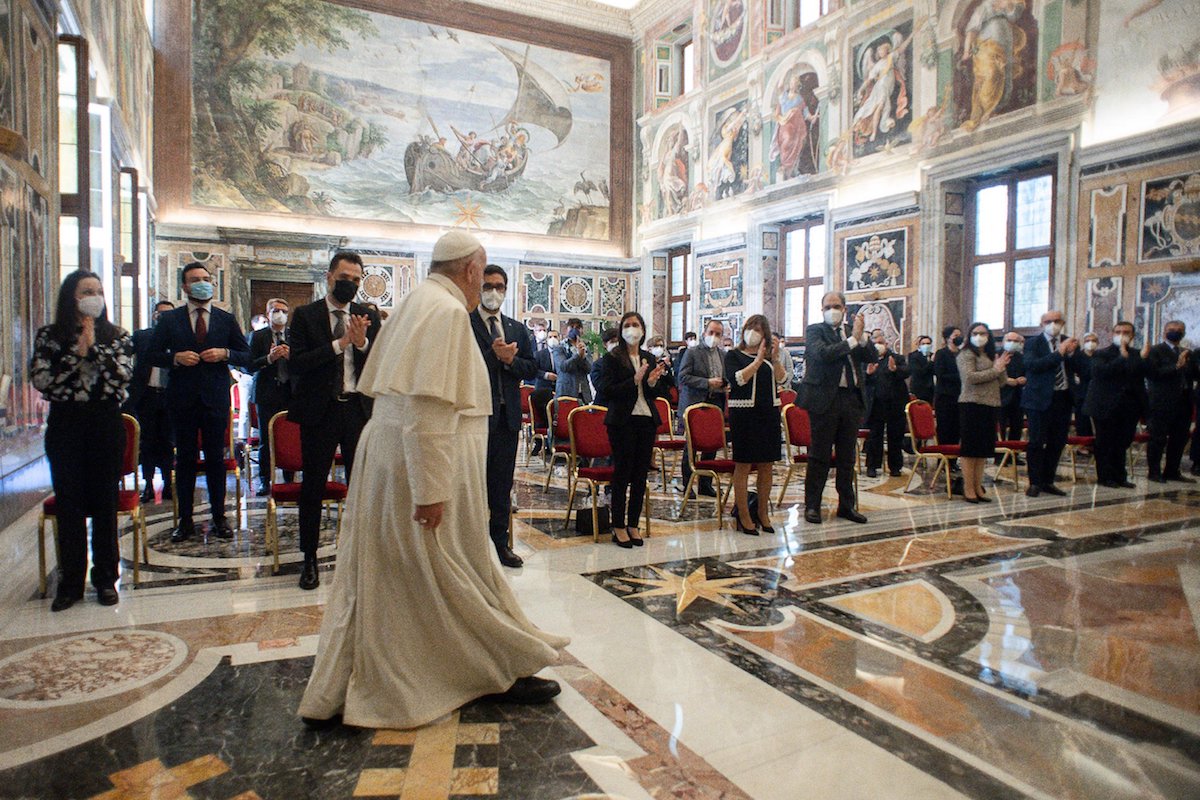A true synodal path comes from making concrete choices that give way to the action of the Holy Spirit, not from following spur-of-the-moment concepts that adhere to the latest trends, Pope Francis said.
“These choices, in order to be feasible, must start from reality, not from the three or four ideas that are fashionable or that have come up in conversation,” the pope said April 30 during a meeting with the national board members of Catholic Action Italy.
“Obviously, one must not leave reality as it is, but instead try to have an impact on it, to make it grow along the line of the Holy Spirit, to transform it according to the plan of the kingdom of God,” he said.
The papal audience came during Italy’s national assembly of Catholic Action held online April 25-May 2 and attended by 800 delegates representing all members of Catholic Action present in 5,400 parishes and every diocese in Italy.
In his address, the pope offered a reflection centered on the words, “action,” “Italian,” and “Catholic,” which define the group’s role in the church as an ecclesial reality.
The word “action,” he said, serves as a reminder that it is God who acts throughout history. God’s action “does not relieve us of responsibility, but instead brings us back to our identity as disciples-missionaries.”
The pope also said the current pandemic, which has caused “each of us to confront the unexpected,” is an opportunity for Christians to “welcome the unexpected rather than ignoring or rejecting it” or fall into “the illusion of functionalism.”
“It is sad to see how many organizations have fallen into the trap of organizational charts: all perfect, all perfect institutions, all the needed money, all perfect,” the pope said. “Be careful not to fall into the slavery of organizational charts, of ‘perfect’ things. The Gospel is messy because the Holy Spirit, when he comes, makes a racket to the point that the action of the apostles (at Pentecost) seems to be the action of drunks.”
Reflecting on the word “Catholic,” Pope Francis said its meaning implies that “the mission of the church has no boundaries” and that distance “can never turn into indifference, it can never become estrangement.”
The pope said that while the lay characteristic of the movement is crucial to its mission in the church, he warned of the danger of “the clericalization of Catholic Action.”
“There is still a widespread temptation to think that the promotion of the laity — in front of so many ecclesial needs — passes through a greater involvement of the laity in the ‘things of priests,’ in clericalization,” he said.
Lay men and women, the pope added, do not need to be “anything different from what they are through Baptism because the laity are “a richness for the catholicity of the church.”
Lastly, the “Italian” nature of Catholic Action implies its connection with Italy’s history which helps the local church be “a hope for the entire country,” the pope said.
Encouraging the members of the group to be “a leaven of dialogue in society,” Pope Francis reminded them that “a church of dialogue is a synodal church” that is guided by the Holy Spirit that “reaches us through the cry of the poor.”
Synodality, he added, is far from being a “nice Catholic parliament” that seeks a majority agreement on pastoral solutions because the presence of the Holy Spirit through “prayer, silence and discernment” is needed.
“There can be no synodality without the Holy Spirit, and there is no Holy Spirit without prayer. This is very important,” the pope said.






